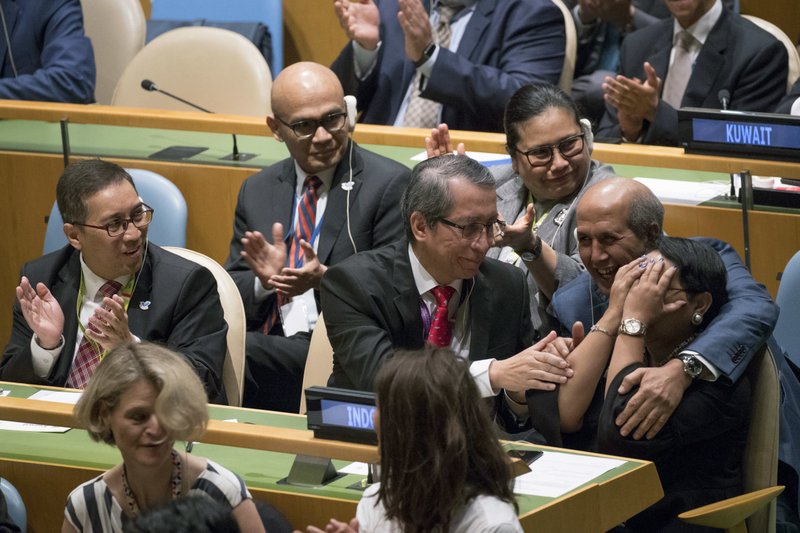UNITED NATIONS -- Indonesia defeated the Maldives on Friday in the only contested election for a seat on the Security Council starting Jan. 1 and will join the U.N.'s most powerful body along with Germany, Belgium, South Africa and the Dominican Republic.
General Assembly President Miroslav Lajcak announced the results of the secret ballot vote in the 193-member world body to loud applause.
The four countries running without opposition all received more than 180 votes.
Indonesia is the world's most populous Muslim nation and has been on the council three times previously. It defeated the Maldives, a small Indian Ocean island nation which has never served on the council, by a vote of 144-46.
Indonesian Foreign Minister Retno Marsudi told reporters afterward that her country will work on the council to promote peacekeeping and peacebuilding, conflict prevention, and U.N. development and environmental protection goals for 2030.
Indonesia will also make "combating terrorism and radicalization through developing a global comprehensive approach that addresses their root causes" a priority, she said.
The Security Council has five permanent members -- the United States, Russia, China, Britain and France -- and 10 members elected by the General Assembly for two-year terms. Five countries are elected every year.
Winning a seat on the Security Council is a pinnacle of achievement for many countries because it gives them a strong voice in matters dealing with international peace and security ranging from conflicts in Syria, Yemen and South Sudan to the nuclear threat posed by North Korea and attacks by extremist groups such as the Islamic State and al-Qaida.
Candidates for nonpermanent seats are chosen by regional groups, and Indonesia and the Maldives were in a contest for the Asia-Pacific group's seat.
Belgium and Germany, which have each served on the council five times previously, were elected from the Western European and Others group of nations. Israel, which was facing an uphill struggle in a three-way race for two seats in that group, dropped out last month saying it "decided to postpone its candidacy."
German Foreign Minister Heiko Maas told reporters Friday that the result was "a fantastic outcome" that showed "the high degree of trust" from other nations. "We now want to live up to this trust," he said.
"We want to be a strong voice for peace in the Security Council, but above all, we want a multilateral world order for the future," Maas said. "We will not shy away, but rather stand firm in the face of difficult decisions. We want to contribute to conflict resolution and crisis prevention."
South Africa, which has been on the council twice, was elected from the Africa group.
South African Foreign Minister Lindiwe Sisulu told reporters that her country was "honored and humbled" for the support and announced that its two years on the council will be dedicated "to the legacy of Nelson Mandela, our icon, and his commitment to peace."
She said that to mark the 100th anniversary of Mandela's birth this year, the General Assembly will hold "a peace summit" in September where South Africa will unveil a statue that will remain at the U.N. to honor him.
Sisulu, the daughter of anti-apartheid activist Walter Sisulu who was imprisoned at Robben Island with Mandela, said South Africa will use its seat on the Security Council to advocate for peaceful settlement of disputes and ensure "that we address the root causes of problems," especially in Africa.
"We believe peace can't be achieved without participation of women," she said, stressing that South Africa will insist that "a gender perspective" is included in all Security Council resolutions.
The Dominican Republic was elected from the Latin America and Caribbean group, and Foreign Minister Miguel Vargas Maldonado thanked the region for allowing the Caribbean nation "to achieve our aspiration to be a member of the Security Council" for the first time.
A Section on 06/09/2018
